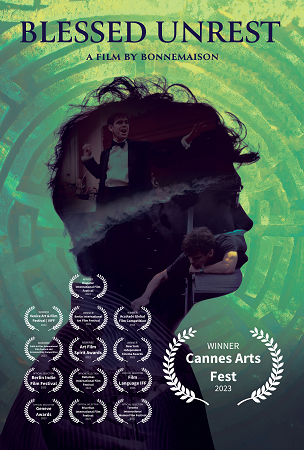
Blessed Unrest 2022
Distributed by Good Docs
Produced by Penny Lee, Astrid Bedoya, and Mari Bonnemaison-Moore
Directed by Mari Bonnemaison-Moore
Streaming, 63 mins
Middle School - General Adult
Christianity; Family Relations; Music
Date Entered: 03/22/2024
Reviewed by Bryan Schuff, Assistant Librarian, SUNY GeneseoBlessed Unrest can teach viewers about resilience after trauma and persistence through adversity. The film focuses on Michael Dodds and the challenges he experienced in becoming a composer. Within the first ten minutes, he tells us that he was sexually assaulted by a cab driver when he was a teenager, and over the following ten minutes of the film, Michael explains how looking into the eyes of Rembrandt in his self-portrait as an old man made him realize that he wasn’t being true to his art. For Michael, this meant that his head needed to serve his heart after they had been disconnected as a result of his assault. Michael said he found healing with the help of love from his family, a lot of therapy from his psychiatrist, and spiritual growth from his Christian faith. This film does not teach viewers how to compose music, how to treat trauma, or how to appreciate art; the viewer must look more deeply into the content of this film to learn about themself, much in the way that Michael looked into Rembrandt’s eyes in order to see within himself. It is inspirational, indeed, but not necessarily educational.
The title of the film was taken from a quote by choreographer Martha Graham which Michael heard recited by actress Rosemary Harris at commencement ceremonies over several years of teaching, and from which he drew inspiration after the words "finally sunk in." That language is consistent with the imagery Michael used throughout the film and in his work: water is often used to represent the force of nature and the turmoil of life’s adversity. To Michael, nature represents divine creation; at the beach, he is able to empty his mind while being engulfed by the white noise of the crashing surf. Michael also spoke of the "rolling green hills" of his imagination and of "musical waterfalls" while composing music about mountain peaks and dark valleys, which also reflected one of the darkest times for his family when his daughter Laurel overcame addiction.
The film's director, Mari Bonnemaison, is also one of the film's producers and writers, as well as a family friend of Michael since their childhood. She used her gifts and talents to create this film showcasing Michael’s gifts and talents in creating music. Her personal connection to Michael allows viewers an intimate perspective through interviews with Michael, his wife, his children, his mother, his psychiatrist, musicians from his symphony orchestra, his priest, and even Rosemary Harris reprising her reading of Martha Graham’s quote. The stories and insights from these prominent people in Michael’s life are corroborated by archival family photos and videos, including Michael’s late father. Perhaps Mari was so inspired by Michael's story that she felt compelled to share it so that viewers may become inspired to discover and realize their own gifts and talents?
The importance religion plays in Michael’s life is clearly presented, but not so as to proselytize to viewers. His church’s anniversary celebration was the impetus for the composition documented by this film. Michael explained why he selected Psalm 145, how he practiced Lectio Divina to comprehend the passage, and how the music he wrote was guided by the words of the psalm as well as other Biblical allusions. It is evident that the psalm resonated with him not only spiritually, but also on a deeply personal and emotional level because he said that the psalm and his symphony are about "how love connects us from one generation to another, how love gives us hope, and love gives us strength in adversity."
This film would be most suitable for showing in music and philosophy classes, but with reservations about how the film isn’t about the composition process or about philosophical or religious concepts beyond their relevance to Michael's work, and the symphony's performance is cut into segments interspersed with interviews. Michael’s passion for creating art through music did not suffer due to cataclysmic events in his life; he sometimes drew inspiration from them, but only after letting go of things which he could not control. As he put it, "Both faith and creativity require an admission of powerlessness and a surrender to what needs to be born." Blessed Unrest might be more accurately classified as a motivational film about how Michael overcame trauma and composed a beautiful symphony drawing upon his philosophical and religious interpretations to find meaning in his life. Perhaps this film can inspire others to learn what motivates and inspires them to find meaning and purpose in their lives.
Awards: Best Documentary, Berlin International Art Film Festival; Best Documentary, Cannes Arts Fest; Best Documentary, New York Independent Cinema Awards; Best Documentary, Chicago Indie Film Awards; Best Documentary, Hispanic International Film Festival
Published and licensed under the Creative Commons Attribution 4.0 license. Anyone can use these reviews, so long as they comply with the terms of the license.